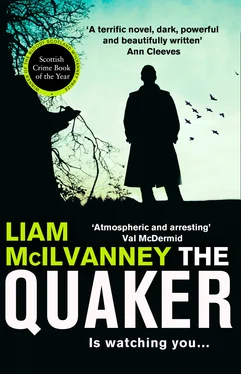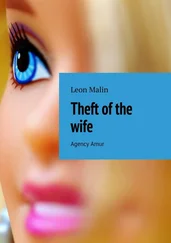Paton scooped his cigarettes from the table and stowed them in his jacket pocket.
‘Actually, hold on here.’ Cursiter’s big hand was raised. ‘We all kick in for the van but you don’t kick up to Glash?’
‘The van’s a necessity. It’s part of the job.’
‘McGlashan’s a necessity, mate. McGlashan’s a fucking necessity. Round here.’
‘I don’t live round here, Brian.’ Paton buttoned his jacket. ‘I live in London. Mr McGlashan will have to visit London if he wants to collect.’
‘He might do that,’ Cursiter said. ‘He might just do that. Everyone kicks up to McGlashan, fella. Sooner or later. Some way or other.’
Paton shrugged. The dog got up and trotted across the floor and lay down in front of the dead electric fire.
‘So you’re in?’ Dazzle’s chin lifted in challenge. Everyone looked at Paton.
Paton frowned. He’d been looking for a reason to say no and he couldn’t find one.
‘Kinda looks that way, doesn’t it?’
‘He-e-ey!’ Dazzle snatched up the whisky and twirled off the cap, but Paton clamped his palm across his glass.
‘One thing.’ He looked at each face in turn and then back to Dazzle. ‘Why’s McGlashan not moving on this himself? Why’s he leaving it to you boys?’
For a moment nobody spoke. Paton had the feeling they had discussed this question before he came, worked out how much to tell him.
‘He’s not been himself.’ It was Dazzle who spoke. ‘He thinks the polis are watching him. He’s been cagey. For months now. Everyone’s frightened to move. Do anything. Till this gets sorted out. This Jack the Ripper shit.’
‘But they’re not watching you?’
‘They’re not watching him, probably. He’s just paranoid. Anyway, who’d watch us, Swifty? We’re not a big enough deal. We’re the waifs and strays, mate. Slip through the cracks.’
Stokes turned to Paton. ‘The Quaker, they’re calling him.’
‘London, Bobby,’ Paton said. ‘I live in London. Not the moon. We get the papers down there.’
He removed his hand and Dazzle poured the shots and they all clinked glasses and drank.
Ten minutes later, he sat in the passenger seat of Stokes’s Zodiac, thinking it through. He liked to hole up after a job was done, get off the streets fast and go to ground for three or four days. The hotel was no good.
‘I’ll need a place,’ Paton said. ‘Somewhere quiet.’
Stokes nodded. ‘For afterwards, like? I know a guy can probably help. Want me to set it up?’
There was a black market in houses. Everyone knew this. Glasgow never had enough houses and the clearing of the slums had only made things worse. There was an underground trade in vacant flats in buildings slated for demolition. Families would scrape together a couple of hundred quid for the keys to a room-and-kitchen in a condemned tenement. They’d get a few months’ breathing space before the wrecking crews arrived, give them time to get something else sorted. That would be fine. A flat in a condemned block would be just the ticket.
He took Stokes’s number when they pulled up outside the hotel. ‘Set it up then, Bobby. I’ll be in touch.’
McCormack sat at his desk in the Murder Room, staring at a typewritten document. The document was two pages long, held together by a paper clip. It contained the witness statement of a man who had danced a single dance with Ann Ogilvie on the night of 2 November 1968, in the Barrowland Ballroom in the city’s East End. Ann Ogilvie, victim number two. Later that night, at some point between midnight and 3 a.m., Ann Ogilvie was strangled with her own American tan tights, having been raped, beaten and bitten by the killer known as the Quaker.
Every twenty-five seconds the pages of the witness statement rippled in the breeze from a circular fan on McCormack’s desk. But McCormack wasn’t reading the words. He was basking in hatred. The tension in the stuffy room was like a palpable force, a malevolent beast that crouched invisibly on top of the cabinets, stalked between the legs of desks, breathed its rank breath on McCormack’s neck. The tension amplified every sound. Typewriter keys sliced the air like cracking whips. A filing cabinet drawer rolled open with a rumble of thunder. People lunged at ringing telephones, desperate to silence their clamour.
He knew, of course, what was causing the problem. The problem was him. He was the rat. The tout. The grass. Resentment came at him in waves from the shirtsleeved ranks.
But what did you expect? It was Schrödinger’s cat: the observer affects the experiment.
Ten days ago Duncan McCormack had been the man of the hour. Ten days ago he’d been sipping from a tinnie in the squad room at St Andrew’s Street, watching his Flying Squad colleagues ineptly gyrating with a couple of more or less uniformed WPCs and some of the younger typists from Admin. It wasn’t yet noon but the party was hotting up. There were muffled whoops as someone upped the volume on the Dansette. All three shifts of detectives were present. Guys had left the golf course or the pub, or wherever they went on their days off. Brothel, maybe. Everywhere he looked people perched on desks or gathered in grinning groups with their plastic cups of whisky and vodka.
Flett was edging towards him through the throng. DCI Angus Flett, commander of the Flying Squad. Chins were tipped in greeting, cigarettes raised in two-fingered benedictions. Flett gripped elbows, punched shoulders, clapped backs, threw mock punches, twisted his hips in that drying-your-backside-with-a-towel move when he passed a dancing typist.
The squad room looked like Christmas. Strings of paper bunting were pinned above their heads. Two desks had been pushed together to form a makeshift bar. Bottles of spirits clustered in the centre: Red Label, Gordon’s, Smirnoff, Bacardi. Four-packs of beer in their plastic loops, green cans of Pale Ale, red cans of Export. Someone had gone out for fish suppers and the sharp tang of newsprint and vinegar and pickled onions mingled with the smoke and sweat and alcohol.
On an adjacent table stood a large birthday cake edged with blue piping, a ‘12’ standing proud of the icing on blue plastic numerals. Twelve was the tariff. Twelve years in Peterhead. They’d watched him cuffed and taken down to the cells, James Kane, one of McGlashan’s lieutenants. It took them over a year to build the case and now they’d got him. Attempted murder. Serious assault. Conspiracy to pervert the course of justice. Guilty on all three counts. Au revoir, fuckface. Have a nice life.
McCormack raised his can of Sweetheart Stout to salute Angus Flett. He felt the beer sway inside the tinnie. He didn’t like beer. He’d drunk just enough so the can wouldn’t spill. He liked whisky well enough but he was playing shinty tomorrow, a grudge match against Glasgow Skye, and he wanted to stay fresh.
‘The hard stuff, Duncan?’
McCormack worked his shoulders, straightened up. ‘Got a game tomorrow, boss.’
‘A game? I’d say war would be nearer the mark. I watched a match once, up in Oban. Jesus. Tough game. They say ice hockey’s based on it.’
McCormack shrugged, sipped his tinnie.
‘Anyroads, need to talk to you, son. Won’t take long.’
In Flett’s office, McCormack closed the door behind him, muffling the noise of the party. Flett got straight to business.
‘Job’s come up, son. I’m putting you forward.’
McCormack nodded slowly. When Flett sat down with the sun at his back, McCormack noticed that he hadn’t shaved; little filaments of stubble caught the light.
‘What’s the job, sir?’
‘It involves a change of scene. You’ll be based in Partick. The old Marine.’
‘That’s the Quaker inquiry. They’ve got Crawford, already. They need another Squad guy?’
Читать дальше












